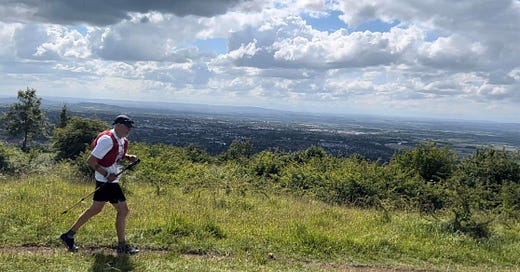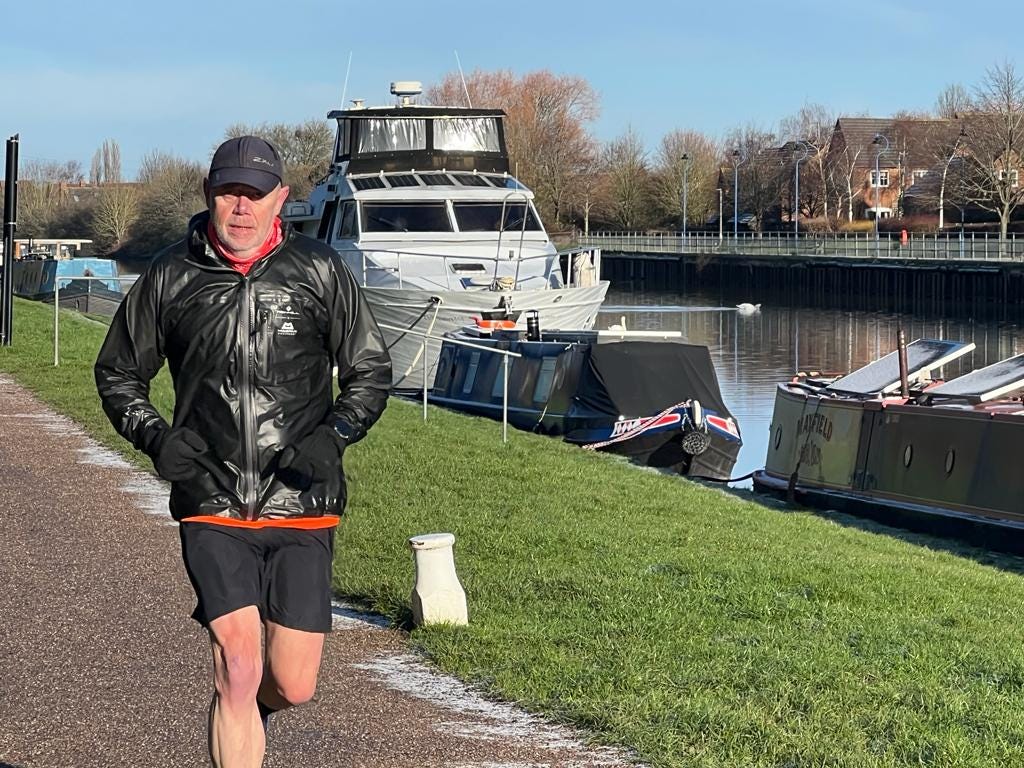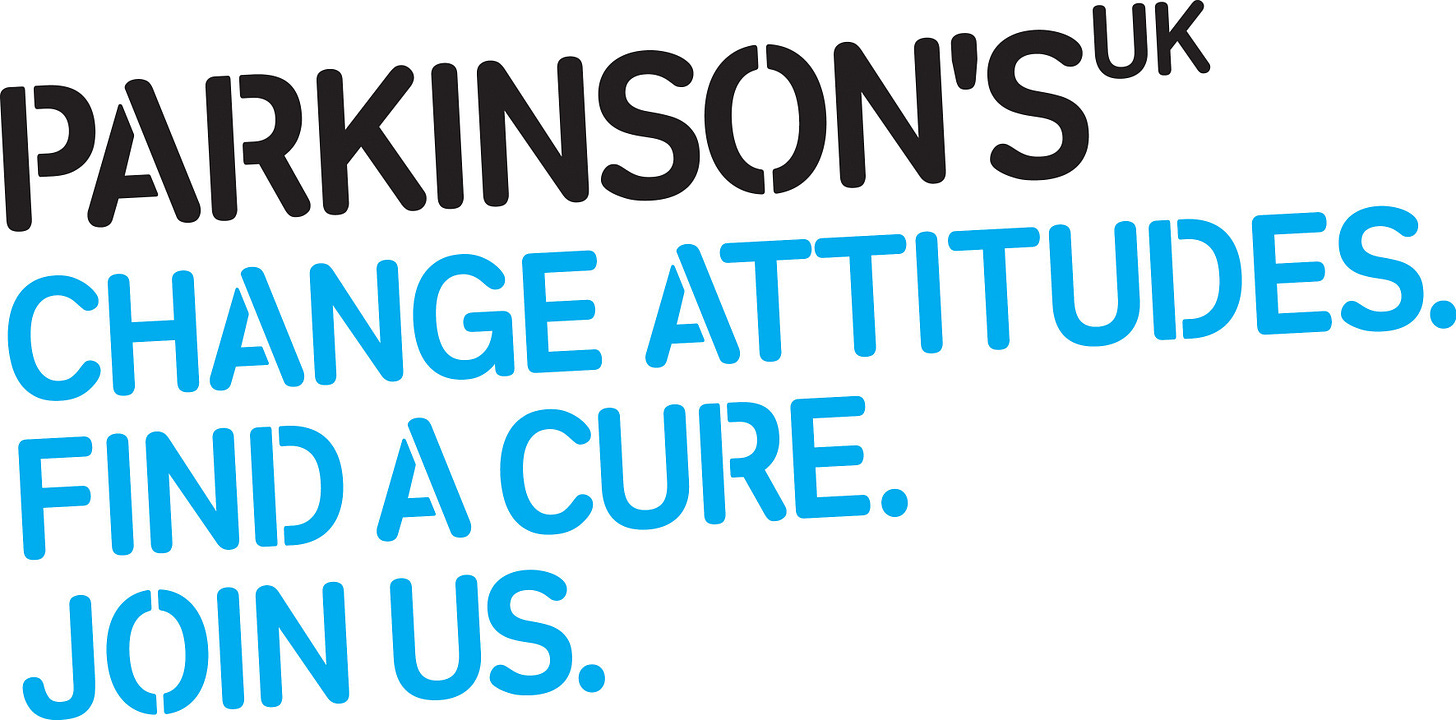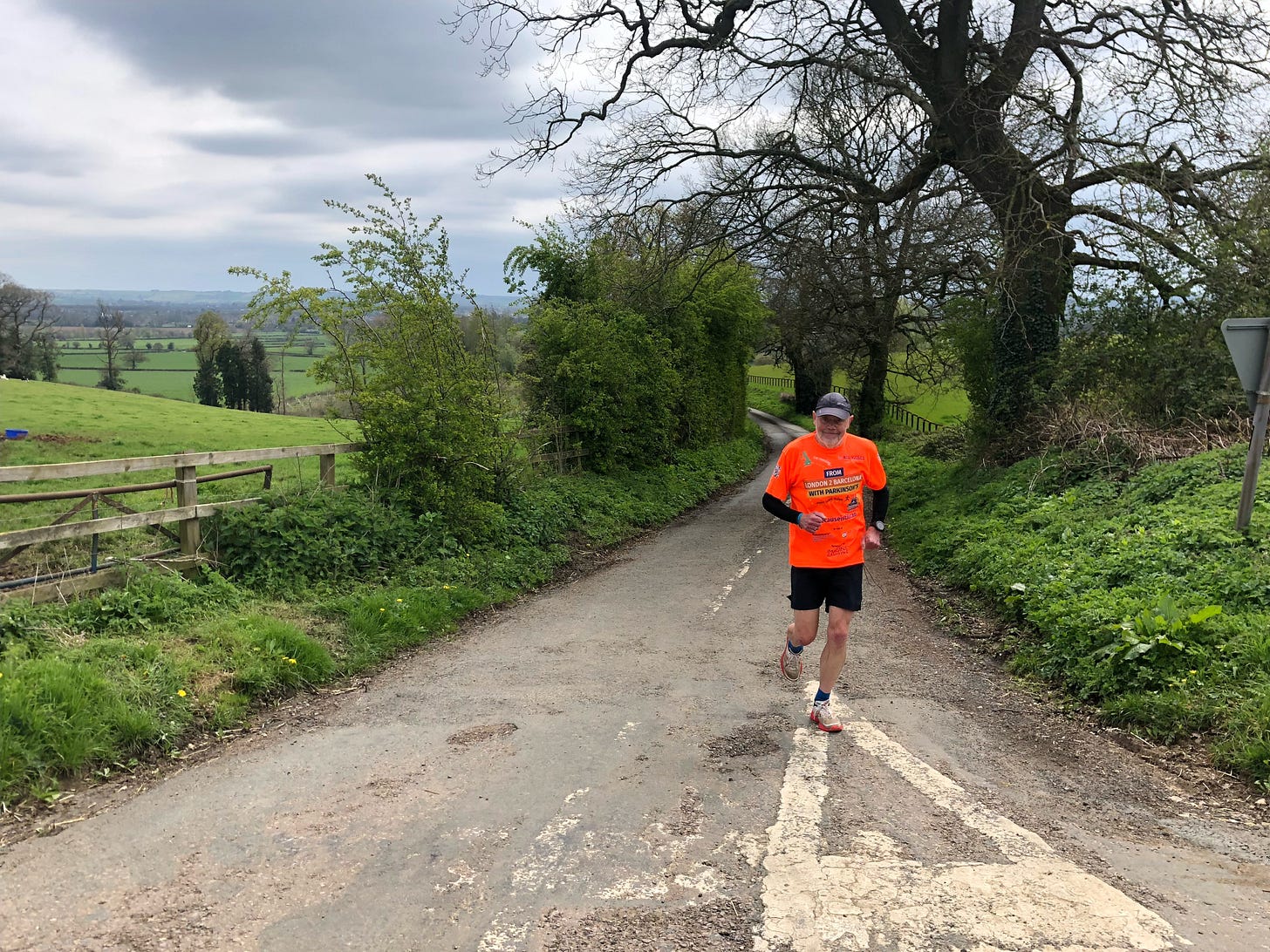Making Parkinson's wait: One runner's epic journey from London to Barcelona
Neil Russell is set to run 970 miles in just over five weeks in an attempt to raise £50k for Parkinson's charities
“For as long as I can I’m still going to do what I want to do. I’m still the boss. Parkinson’s will just have to wait its turn.”
Neil Russell is 65. He was diagnosed with Parkinson’s in 2018. And he’s about to run 970 miles from London to Barcelona.
The epic challenge, set to last just over five weeks and starting on May 25, is the latest extreme endurance feat Neil has taken on, after he ran from John O’Groats to Lands’ End - known as a ‘Jogle’ - last year.
Neil, who is hoping to raise £50,000 for Cure Parkinson’s and Parkinson’s UK told Running Tales: “The reason I’m so determined to do these things is to stick two fingers up at Parkinson’s, and say ‘no, I’m not going to sit at home and watch Netflix, and vegetate and lead a sedentary lifestyle, I am going to do crazy things’.”
When the Bourton-on-the-Water resident was diagnosed with Parkinson’s, his first words to his neurosurgeon were, “Can I still carry on running? Because I need to run.”
He was relieved when he was told rather than causing him any problems, “energetic exercise” would actually help him as it would stimulate his brain.
Neil told the Running Tales Podcast he immediately decided he would not let the condition ruin his life. That pledge is something he has held closely too, although things have not always been easy.
“Even five years later, I still sometimes think ‘have I got Parkinson’s?’ I can’t believe I have,” Neil said.
“It’s something old people have. I’m 65, so in the elderly category but I have to pinch myself as a reminder that I have got Parkinson’s.
“A lot of everyday things you take for granted, I can’t do. For instance, writing. If I wanted to do a little note to my granddaughter in a birthday card I can’t do it.
“It’s only when you can’t do something as simple as your handwriting that you realise how much you rely on it. While it’s not life threatening, it is difficult to come to terms with.
“When I first got the diagnosis, that night I just remember being at home and going through my thoughts and very quickly came up with the notion, with a bit of anger I guess, to not let Parkinson’s rule my life.”
In his own words: How Parkinson’s effects Neil’s life - and his running:
“I have a dominant tremor Parkinson’s, which means my right hand is constantly tremoring away.
My left hand comes out in support of that by also becoming a tremor.
Ninety-nine per cent of the time I get on with it and it doesn’t really bother me, but occasionally - because I’m only human - it does get me down and when I’m running it can cause tendinitis in my wrist - one of the few things that can actually stop me from running.
My other symptoms, with regards to running, include that I have a tendency to fall over more than the average runner. My sense of balance is worse when I start to fatigue, and my scars on my knee are proof of that.
I have had some close shaves with oncoming, fast-moving traffic while crossing the road and falling over, and it’s quite scary to think of what could have happened.
I sometimes also become a bit disoriented. This doesn’t last long. It’s linked more to the medication that it is the actual Parkinson’s, but it can be quite unnerving.
I’ve also got a problem with my voice. It tends to go very low and quiet, and I’m not conscious of it.
On the voice, I’ve just started to enter another phase of symptoms which is losing my way. I can be in mid-conversation, an unstressful conversation with a friend or anybody for that matter, and I completely lose my train of thought.
And this is a common Parkinson’s condition. When it happens, I momentarily go blank and think ‘oh, my goodness, I can’t remember what I was talking about’.
Usually it will come back to me, and I’m able to carry on as normal. People that know me, don’t get stressed at all as they know that’s what Neil is like but people that don’t know me can get a bit ‘what do we do?’ It’s one of those difficult moments when you are not quite sure what to say or do.
A lot of my symptoms occur when I’m tired. Today, I’ve done 28 miles running. I did 28 miles yesterday and I’ve got a marathon to do tomorrow. When I’m tiring, these symptoms become more evident and common.
I’m supposed to rest in the afternoons and sleep, but I’m not very good at, at three or four o’clock in the afternoon, going to have a lie down. I feel I should be doing something.”
Neil said the idea to run from London to Barcelona came during a period of low-mood after he finished his Jogle challenge.
“That had been my whole life for seven or eight months. The training and actually doing the run. I did over 36 back-to-back marathons and covered 948 miles,” he said.
“When I finished it, I had a bit of post-Jogle blues. I was lost for what to do because I had no more training, no more planning. It was over.”
It was when he heard a speaker at a Parkinson’s UK function talking about the World Parkinson’s Congress in Barcelona that he “knew immediately what my next challenge was going to be”.
Supported by his partner Nicky, who will crew a camper van, Neil will set out from Hanover Square in London.
His route will take him to Portsmouth, across to Caen on the ferry and then through France and over the Pyrenees.
By running around 28 miles a day, he is hoping to reach Barcelona by July 4 in time for the Congress.
What is Parkinson’s?
Parkinson’s is a progressive neurological condition for which there is currently no cure.
The condition develops when nerve cells responsible for producing a chemical known as dopamine die. Dopamine allows messages to be sent to the parts of the brain that coordinate movement.
With the loss of dopamine-producing nerve cells, these parts of the brain are unable to work normally, causing symptoms of Parkinson's to appear.
In the UK, around 145,000 people are already living with Parkinson’s. With the population growth and ageing, it is estimated this will increase by a fifth, to around 172,000 people in the UK, by 2030.
Neil is currently starting to taper following a gruelling training regime which has seen him complete a series of 100 mile weeks, back-to-back marathons and a three day segment that saw him complete two 28 miles routes and a marathon.
“I’m in probably the best condition I’ve ever been in,” he said. “I’m quietly confident but I am apprehensive. The expectation on me is quite significant.
“There are a lot of people who have supported me and I have a fear of letting them down.
“I had a message from a guy in Oregon. He said he was 71 and had recently been diagnosed with Parkinson’s, and that he’d read about me and it was such an inspiration for him that he’s decided to take up running himself.
“It’s people like that who I’m doing this for, to let them know it’s not the end of the world when you get a diagnosis of Parkinson’s. If you’ve got the right mindset, you can still do amazing things.
“My message is lead a normal life, don’t give up, just be determined. You will get knock backs. There will be very well meaning people who will say you shouldn’t be doing that - just ignore them, and just do it.”
What the charities said:
Aaron Coleman, Regional Fundraiser at Parkinson's UK, said:
"We are so grateful to Neil for taking on this incredible challenge for Parkinson's UK.
"With more than 40 potential symptoms, Parkinson's can devastate lives. We've made huge breakthroughs in the last 50 years, but there is still no cure and current treatments are not good enough.
"We hope that Neil inspires others to get involved with Parkinson's UK. There are lots of ways to support us - from volunteering at an event, to campaigning for better services. Without the generosity of people like you, our work would not be possible."
Annabel Tompkins, Head of Public Fundraising at Cure Parkinson's, said:
"Neil is truly inspirational, not just in his determination to complete such a demanding challenge but in the way he is rallying to raise both funds and awareness of the condition. We are so grateful to Neil for helping to bring us closer to finding the cure for Parkinson's that is so desperately needed."
Neil said a major part of his achievements is being mentally strong: “You can be physically super fit and strong, and have endurance, but if you are mentally not resilient enough then you are going to struggle.”
He is currently nursing “injuries and niggles'“ to his hamstring, glutes and lower back, but said running through pain is something you have to be prepared to do.
“You can’t run those sort of distances without injuries, niggles, aches and pains,” he added.
Also on Running Tales:
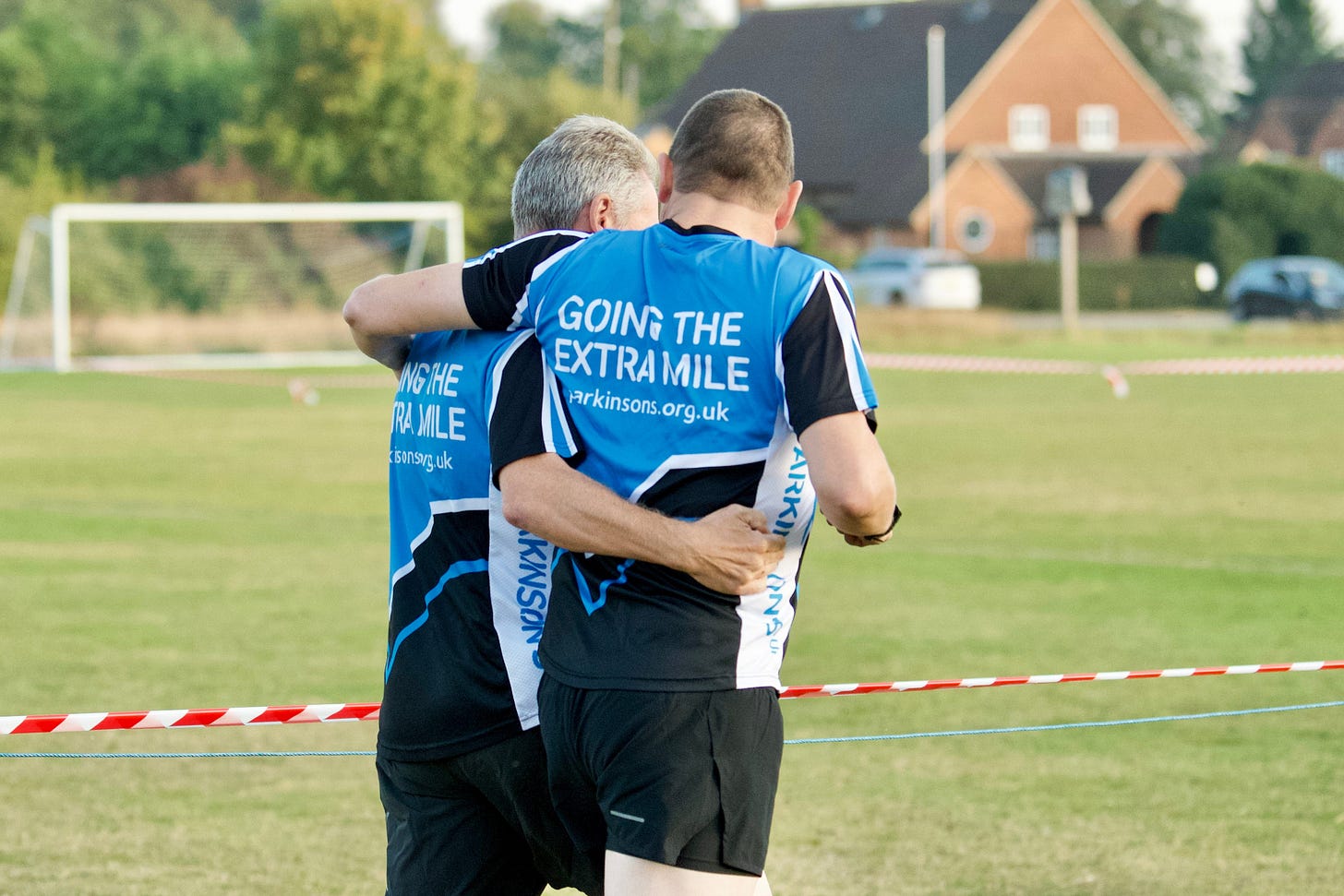
How one man's Parkinson's diagnosis inspired him to his greatest running achievements
Super Mario - The Ironman who always finishes with a smile on his face
Those aches and pains are something Neil is used to dealing with following his Jogle challenge, which saw him raise £11,000 for the same charities he is running for this year.
He also faced near death in Loch Lomond in Scotland, when a beautiful, straight road suddenly turned into a series of tight bends.
“If you’ve got something to jump on to then it’s not a problem, but there was eight miles of continuous s-bends, and on one side of the road was a granite rock face and the other was crash barriers,” he said.
“There were these huge artics carrying timber from the woods where they’d been felling trees, and there was no-where to get out of the way.
“They were so close to me I genuinely thought I was going to become roadkill. You could see the rivets in the trailer as the lorries passed, inches away.
“That was probably some of the fastest running I’ve ever done, that eight miles.”
After completing 36 miles on the final day of the challenge, he was greeted by friends and family at Lands’ End - but felt surprisingly deflated.
“There were tears from all of them, and hugs and kisses. I was the only one who didn’t shed a tear.
“I was a bit, ‘what’s going on here, I’ve just run from A to B really, I haven’t saved anyone’s life’.
“My father had passed away a year-and-a-half beforehand and he would have been so proud of me. When I touched the line, when I finally finished I said ‘that’s for you dad’.
“That’s the only thing I remember that caused any emotion for me. I was smiley and happy, but I tend to keep my emotions bottled up.
“I didn’t quite get what I had done. Three or four months later I was at home watching the TV, and the weather forecast came up and they had a big map of the United Kingdom.
“All of a sudden, the reality hit me. I just saw the distance from John O’Groats to Lands’ End, and I thought ‘wow, I ran that’ and got quite emotional.
“That was my moment to shed a tear.”
It seems for Neil Russell, both Parkinson’s and tears have to wait their turn. After all, he’s probably too busy running.
Thanks as ever for reading and listening to Running Tales. We couldn’t do this without your support - please back us to keep going by…

